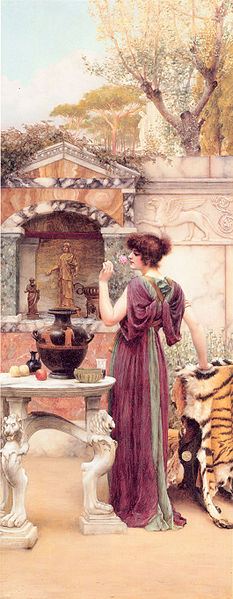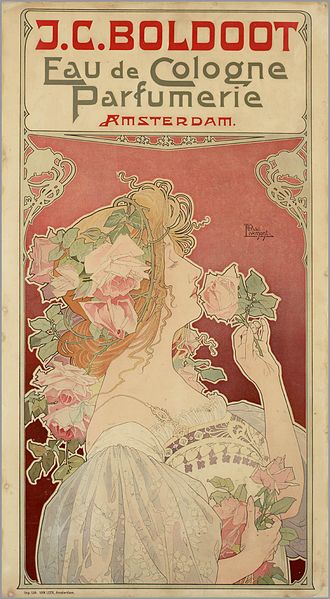the exoticism and humanity of smell
Looking at these images of people from many different historical periods interacting with scent makes me think about the ways in which thinking about people of the past smelling things makes their lives seem somehow more real, but at the same time, it makes them seem more exotic.
For example if we were to smell the contents of that Egyptian pot, I’m sure we would feel at home, comforted by the recognizable smells of frankincense, lotus, or rose. But also, the figures’ attitudes, their ritualistic poses, their very alien appearance, makes the content of that pot seem somehow untouchable, distant.
A few Centuries Later….

we can imagine how that swag of citrus and laurel behind this religious tableau smells. We can even imagine the sweet musty smell of Mary Magdalene’s perfumed hair interacting with Jesus’ dirty, sweaty feet. but we are also distanced by the exotic foreignness of the characters’ gestures, by the knowledge of this as a foundational myth, an untouchable—in many ways- story.
Meanwhile, back in Rome…..

This Roman lady at her toilet is in ways repeating a time-honored gesture that most of us echo every day—she puts on a dab of scent. But the amphora, the cold stone table, the tiger skin, the nobility of her robes, and the fetishism of Roman culture exhibited in this painting make her seem somehow remote, an object of admiration, but not identification….
A Few Centuries Later….
This romantic ‘medieval’ maiden smells a rose, taking a moment out of a busy[?] day to enjoy nature’s blessings. We know the stereotypes…is she thinking of her love away at war? Is she dreaming of a lover? is she thinking of the Virgin Mary? Who knows. We are voyeurs, projecting our fragrant fantasies onto her. She is a caricature, a flat, eroticized image. We imagine: “we have all smelled roses. We are all the same.” But roses have changed, Western culture has changed; this fictional maiden is ultimately unknowable.
A little Over a Century ago…..

The Art Nouveau period is one we decadent, baroque, early turn-of-the-21st-century residents can understand, to a certain point. We understand the existential choice to give way completely to pleasure in the face of an increasingly mechanized world. Yet this sniffer is impossible. Stylized beyond understanding, she somehow embodies the idea of the rose, and specifically of the fin de siecle blowsy rose, overblown, decadent, dripping with redundant art.
Food for thought, anyway….
does thinking of people smelling things in the past, thinking of old perfumes and the people who wore it, make you feel closer to the past or more remote from it? Comments, anyone?
CREDITS:
http://www.wysinfo.com/Perfume/Perfume_route.htm
James Joseph Jacques Tissot, The Ointment of the Magdalene Online Collection of Brooklyn Museum; Photo: Brooklyn Museum, 2007, 00.159.214_PS2.jpg
John William Godward At the Garden Shrine, Pompeii, courtesy of artrenewal.org
John William Waterhouse , ''' The Shrine'''
J.C. Boldoot, Eau de Cologne Parfumerie, Amsterdam, Geheugen van Nederland by Henri Privat-Livemont



Beautiful, where do you find all this art?
ReplyDeleteI love the idea of re-creating lost fragrances, of smelling something that might have been worn in the past, especially egyptian because, you're right, the ingredients are familiar but the images a perfume like that induces are so exotic. That's why I ordered samples of the new DSH egyptian perfumes
The Past is ALWAYS w/ us - good (classic scents)or bad (pollution!) results! Jesus is referred to as Lily-of-the-Valley for a few reasons, and both of them are eternal! (I personally bet He loves Andy Tauer`s newest effort! :-) )
ReplyDeleteWell, as a former European history major in college, I love the historical aspect to vintage scents - it does make me feel connected, knowing something has been around that long, thinking of other women who have enjoyed the same things I currently am.
ReplyDeletelove what you are doing here. rare beauty.
ReplyDeletethank you all for your thoughtful comments!
ReplyDeleteBeautiful photos. Love what you are doing too. :)
ReplyDeletehuman pheromones